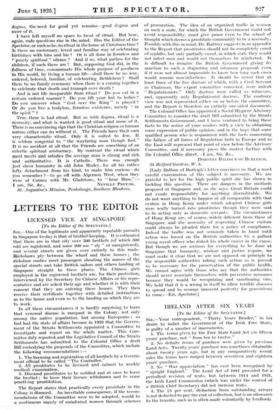LETTERS TO THE EDITOR
LICENSED VICE AT SINGAPORE
[To the Editor of the SPECTATOR.] SIR,—One of the legitimate and apparently reputable pursuits in Singapore to-day is that of brothel-keeping. It is estimated that there are in that city over 500 brothels (of which 300 odd are registered, and some 200 are " sly " or unregistered), and several streets are given over entirely to this trade. Rickshaws ply between the wharf and these houses ; the rickshaw coolies meet passengers shouting the names of the special streets and take British sailors and others landing at
Singapore straight to these places. The Chinese girls employed in the registered brothels are, for their protection, interviewed by the Secretary for Chinese Affairs or his repre- sentative and are asked their age and whether it is with their consent that they are entering these houses. They then receive their certificate together with detailed instructions as to the house and even as to the landing on which they arc to work.
In all these circumstances it is hardly surprising to learn that venereal disease is rampant in the Colony, not only among the native population, but among Europeans ; so bad had the state of affairs become in 1923 that the Govern- ment of the Straits Settlements appointed a Committee to investigate and report on the whole matter. This Com- mittee duly reported, and the Legislative Council of the Straits Settlements has submitted to the Colonial Office a draft Bill embodying the proposals of the Committee, which include the following recommendations :- 1. The licensing and registration of all brothels by a Govern- ment official to be called " The Controller."
2. All prostitutes to be licensed and submit to weekly medical examination.
3. Diseased prostitutes to be notified and at once to leave the brothel ; to have their licence withdrawn and to cease practising prostitution.
The Report states that practically every prostitute in the Colony is diseased. An inevitable consequence, if the recom- mendations of the Committee were to be adopted, would be a continuous supply of uninfected women through schemes of procuration. The idea of an organized traffic in women on such a scale, for which the British Government could not avoid responsibility, must give pause even to the school of thought which deems a prostitute community to be a necessity. Possibly with this in mind, Dr. Rattray suggests in an appendix to the Report that prostitutes should not be completely cured of syphilis, but only partially cured, in which state they would not infect men and would not themselves be reinfected. It is difficult to imagine the British Government giving its sanction to such a disgusting and inhuman proposal, even if it were not almost impossible to know how long such cases would remain non-infectious. It should be noted that at least three of the five doctors of which, with a Civil Servant as Chairman, the expert committee consisted, were ardent " Regulationists." Only doctors were called as witnesses, and, apparently only Regulationist doctors. The contrary view was not represented either on or before the committee, and the Report is therefore an entirely one-sided document.
The Colonial Office has appointed a Social Hygiene Advisory Committee to consider the draft Bill submitted by the Straits Settlements Government, and I have ventured to bring these facts to the notice of your readers with a view to obtaining some expression of public opinion, and in the hope that some qualified person who is acquainted with the facts concerning the failure of all forms of Regulation both in Europe and in the East will represent that point of view before the Advisory Committee, and if necessary press the matter further with the Colonial Office direct. —I am, Sir, &e., DOROTHY BALFOUR OF BURLEICTI.
31 Bedford Gardens, W. 8.
[Lady Balfour of Burleigh's letter convinces us that a most careful examination of this subject is necessary. We are grateful to her for the high public spirit she has shown in tackling this question. There are dangers in the methods proposed at Singapore and, as she says, Great Britain could not evade responsibility for anything discreditable. We do not want anything to happen at all comparable with that system in Hong Kong under which adopted Chinese girls were really turned into prostitutes though they were said to be acting only as domestic servants. The circumstances of Hong Kong are, of course, widely different from those of Singapore, and the necessity of respecting Chinese custom could always be pleaded there for a policy of compliance. Indeed the traffic was not seriously taken in hand until action was forced on the British authorities by a gallant young naval officer who risked his whole career in the cause. But though we are anxious for everything to be done at Singapore that humanity, wisdom and justice require, we must make it clear that we arc not opposed on principle to the responsible authorities taking such action as is proved to be necessary for the preservation of the public health. We cannot agree with those who say that the authorities should never associate themselves with preventive measures because they would be recognizing and sanctioning vice. We hold that it is a wrong in itself to allow terrible diseases to spread and to scourge innocent posterity for generations to come.—En. Spectator.]














































 Previous page
Previous page